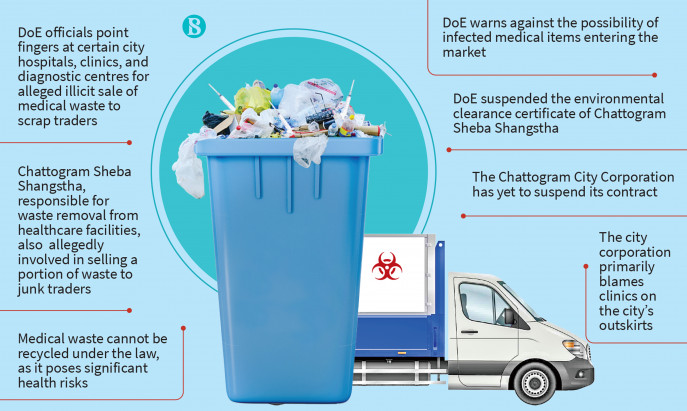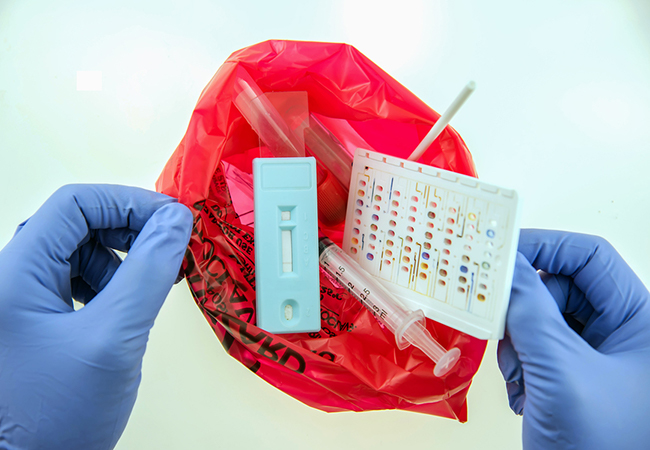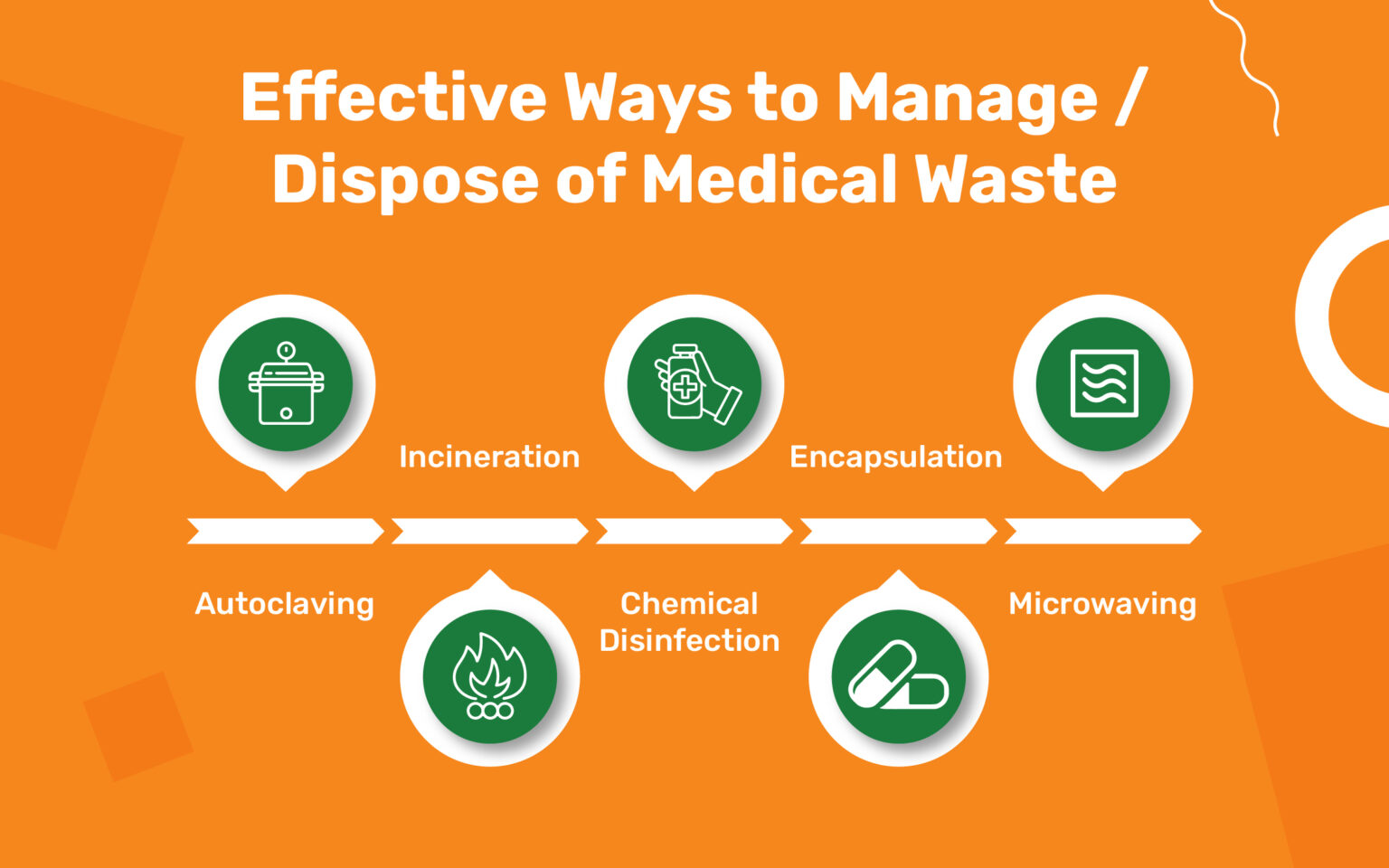Guardians of Cleanliness: Citizen Medical Waste Removal Service for Your Comfort
Guardians of Cleanliness: Citizen Medical Waste Removal Service for Your Comfort
Blog Article
Remain Ahead of Rules: Specialist Advice on Medical Waste Disposal
In a globe where the medical care market is continuously evolving, it is crucial for medical facilities to remain ahead of regulations when it comes to the correct disposal of medical waste. From understanding the various classifications of medical waste to executing the right collection and partition techniques, this discussion will supply actionable pointers and useful insights to aid facilities stay in advance of guidelines in the ever-changing landscape of medical waste disposal.
Recognizing Clinical Waste Categories
Understanding clinical waste classifications is important for proper disposal and monitoring in medical care centers. Medical waste refers to any waste created by healthcare tasks that might position a threat to public health and wellness or the setting. It is vital to categorize medical waste properly to ensure its risk-free handling, transport, disposal, and therapy.
There are a number of groups of medical waste that health care centers require to be familiar with. The most typical categories include contagious waste, pathological waste, sharps waste, pharmaceutical waste, and chemical waste. Each group has details guidelines and policies for its appropriate monitoring and disposal.
Infectious waste includes materials polluted with blood or various other physical liquids, such as handwear covers, dress, and laboratory cultures. Pathological waste refers to human tissues, organs, or body parts that need special delivery and disposal. Sharps waste consists of made use of needles, syringes, and other sharp objects that can cause injury and transfer infections. Pharmaceutical waste makes up ended, extra, or infected drugs that need careful handling and disposal. Finally, chemical waste includes solvents, anti-bacterials, and various other chemical materials made use of in medical care centers.
Remaining Up-To-Date With Regulatory Modifications
Staying present with regulatory changes is essential for healthcare facilities to make certain conformity and appropriate administration of medical garbage disposal. medical waste removal service. With policies constantly evolving, it is crucial for medical care facilities to stay current to stay clear of fines, fines, and potential injury to the atmosphere and public health and wellness
To stay ahead of regulative modifications, healthcare centers must establish a system for surveillance and monitoring updates. This can be done by subscribing to regulative newsletters, going to conferences and workshops, and actively joining sector associations. In addition, facilities should assign an employee or team accountable for staying notified and disseminating info to relevant stakeholders.
Routine interaction with regulatory firms is also vital. Health care centers need to establish relationships with neighborhood, state, and federal companies to guarantee they recognize any kind of changes in guidelines that may affect their waste monitoring techniques. This can be done through routine conferences, participation in public remark durations, and proactive interaction with governing agencies.
Additionally, healthcare centers should take into consideration partnering with waste management companies that concentrate on medical garbage disposal (medical waste disposal services with WasteX). These companies are typically skilled in the current policies and can supply advice and assistance to ensure compliance
Executing Appropriate Collection and Partition Approaches
To properly manage medical waste disposal, healthcare facilities should establish proper collection and segregation methods based on regulatory guidelines. Implementing these methods guarantees the safe handling and disposal of potentially hazardous materials, protects the setting, and decreases the threat of injuries and infections to medical care employees and the public.
Appropriate collection and segregation methods involve the usage of marked containers and classifying systems. Health care facilities should provide plainly classified containers for different kinds of clinical waste, such as sharps, transmittable waste, pharmaceutical waste, and non-hazardous waste. These containers need to be color-coded and clearly significant to stay clear of complication and promote easy recognition.
In addition, medical care centers need to train their staff on the correct treatments for gathering and segregating clinical waste. This includes educating them on the various kinds of waste, the appropriate containers to make use of, and the value of following standards and guidelines. Normal training sessions and refresher course training courses need to be carried out to guarantee that team member continue to be updated on best techniques.
Moreover, healthcare centers should develop a system for regular collection and disposal of clinical waste. This may entail partnering with certified waste monitoring companies that concentrate on medical garbage disposal. These companies will certainly ensure that the gathered waste is transferred and disposed of in conformity with governing requirements.
Picking the Right Disposal Methods

Incineration is one of the most common and efficient approaches for disposing of certain types of medical waste, such as pathological waste and sharps. It includes the controlled combustion of waste at heats, minimizing it to ash. Nevertheless, incineration can launch unsafe toxins right into the air and add medical waste disposal services with WasteX to air contamination.

Other disposal approaches include chemical treatment, microwave therapy, and landfilling. Chemical treatment entails using chemicals to neutralize the waste and decontaminate. Microwave treatment makes use of microwave energy to warmth and sanitize the waste. Landfilling entails burying the waste in a marked landfill location (medical waste disposal services with WasteX). Landfilling should be the last resort due to the prospective danger of contamination to dirt and groundwater.
Guaranteeing Compliance Through Documentation and Training
After very carefully taking into consideration the ideal disposal approaches for clinical waste, medical care centers have to make certain conformity with laws and decrease ecological influence by applying reliable documents and training treatments. This action is vital in preserving a sustainable and safe setting for both medical care employees and the general public.

Training is similarly vital in making certain conformity with policies. Health care workers who handle clinical waste should receive ideal training on waste partition, managing, and disposal procedures. This training should cover subjects such as the correct usage of personal protective equipment, recognition of various sorts of waste, and the proper disposal techniques for every waste category. By providing detailed training, health care centers can encourage their personnel to make enlightened choices and lessen the threat of inappropriate garbage disposal.
Verdict
Finally, remaining in advance of policies in clinical garbage disposal is essential for medical care facilities. medical waste removal service. Comprehending the various groups of clinical waste, staying upgraded with regulative changes, applying correct collection and partition techniques, selecting the appropriate disposal approaches, and making certain conformity via documents and training are all necessary actions. By following these guidelines, healthcare companies can efficiently dispose and manage of clinical waste in a accountable and risk-free manner
From comprehending the different classifications of clinical waste to implementing the appropriate collection and partition approaches, this conversation will certainly offer workable tips and valuable understandings to aid facilities remain ahead of guidelines in the ever-changing landscape of clinical waste disposal. - medical waste disposal services with WasteX
The most typical classifications include transmittable waste, pathological waste, sharps waste, pharmaceutical waste, and chemical waste. Health care facilities must give clearly labeled containers for different kinds of clinical waste, such as sharps, infectious waste, pharmaceutical waste, and non-hazardous waste. Medical care facilities should develop a comprehensive system to videotape and track all aspects of clinical waste disposal, consisting of types of waste created, amounts, and disposal approaches made use of. Medical care employees who handle medical waste should get appropriate training on waste segregation, managing, and disposal treatments.
Report this page